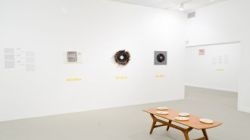
Tamara Masel / Luce Irigaray
Tamara Masel
Born in Buenos Aires, Argentina, 1965
Lives and works in Tel Aviv
From the inception of her career, Tamara Masel's works have been imbued with a female sensibility; over the years, they have become increasingly anchored in female thinking. The images she has photographed in recent years - ranging from objects to falling stars - are characterized by doubling, multiplicity, and repetition. Irigaray views these qualities as a way of undermining the belief in a single, rational, monolithic form of being, which underlies patriarchal thought. An El-Al napkin and stickers, for instance, come together in one of Masel's photographs to form the portrait of an (absent) flight attendant through the objects that define her identity and role; cardboard boxes bearing a photographic image of an alarm clock set for 12:00 call to mind the story of Cinderella; and a pair of electric kettles forms a touching portrait of a couple. Masel's works move between references to Irigaray's theoretical concepts and the wish for a nongendered reading.
Luce Irigaray
Born in Belgium, 1932
Lives in France
Western thought, according to the psychoanalyst, feminist theorist, and cultural critic Luce Irigaray, is predicated upon sexual difference. The construction of this difference has led to the establishment of oppressive social relations, and of a patriarchal worldview that perpetuates the submission of women. Irigarary seeks to establish a symbolic order that is not predicated upon the ideal of masculinity, and thus allows for an understanding of female identity that is not formed in relation to this ideal. According to Irigaray, women should recognize their difference and their distinct qualities, and demand of society to acknowledge and respect them. In her book This Sex Which is Not One (1977), she focused on the heterogeneity and fluidity of female being, and on the distinctions between femininity and masculinity, without constructing them in terms of a dichotomy.